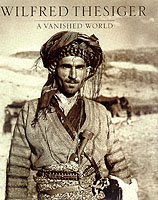|
Arabia da |
Numero di utenti collegati: 8882 |
|
|
|
15/11/2024 07:59:03 |
|||
|
Indietro
- torna alla pagina precedente |
|||
|
Arabian Sands Thesiger Wilfred 
| ||||||||
|
Editeur - Casa editrice |
Penguin Travel | |||||||
|
Città - Town - Ville |
Orig. Longmans, Green. 1959 | |||||||
|
Anno - Date de Parution |
1959 | |||||||
|
Titolo originale |
Arabian Sands | |||||||
|
Lingua - language - langue |
eng | |||||||
|
Ristampa - Réédition - Reprint |
2007 | |||||||
|
|
||||||||
|
|
|
|
| |

|
Amazon.com (United States) - order this book Arabian Sands |
||
|
| ||||||||
|
Thesinger on BBC (8') da YouTube
|
||||||||
| Consulta anche: Sito sull'autore (english) | ||||||||
| Recensione in lingua italiana | ||||||||
|
Thesiger è l'ultimo tra i grandi viaggiatori britannici ad aver esplorato l'Empty Quarter, il deserto dei deserti, il solo luogo in cui "si può trovare la pace della solitudine". "Sabbie arabe" è il resoconto dei suoi viaggi in un arco di tempo che va dal 1946 al 1950. E' un classico ricco di centinaia di aneddoti che restituiscono al lettore il sapore della vita originale dei beduini. In un tempo fuori dal tempo, tra carovane e soste, silenzi e colloqui, si può condividere la vita di un popolo fiero e generoso, religioso e violento, fatalista e solidale, un vita aspra e affascinante di cui Thesiger dice: "Nessun uomo può restare lo stesso dopo averla conosciuta." | ||||||||
| Biografia | ||||||||
|
Wilfred Thesiger nacque ad Addis Abeba nel 1910 e studiò a Eton e Oxford. Nel 1935 fece parte del Sudan Political Service e quando scoppiò la guerra venne distaccato alla Sudan Defence Force. Dopo la guerra viaggiò nel Kurdistan, nel sud dell`Irak, in Marocco, in Africa centrale e orientale. Tra le sue opere ricordiamo Sabbie arabe (Neri Pozza 2002), Desert, Marsh and Mountain: The World of a Nomad, The Life of my Choice e Visions of a Nomad. | ||||||||
| Consulta anche: Sito sull'autore (english) | ||||||||
| Consulta anche: Thesinger on BBC (8') da YouTube | ||||||||
| Consulta anche: Milord a spasso con i babbuini - Stefano Malatesta su Repubblica | ||||||||
| ||||||||


 Arabian Sands
Arabian Sands
